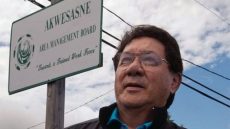SURREY, B.C. — When Rob Rai and the Surrey School District opened the Wrap Project in 2009, those starting the dedicated anti-gang program plainly acknowledged that groups of local teenagers were committing serious crimes.
The launch was progressive action from the city southeast of Vancouver, which had been plagued for decades by drug-related gun violence, Rai said.
The need for the unit is especially apparent after a spate of shootings in the last three months in Surrey and neighbouring Delta. One person has been killed and several others have been injured in about three dozen shootings.
The federal government recently signed a $3.5 million contract over five years in added funding for the prevention program that will immediately wipe out a waiting list of 30 students.
"I don't want to sound arrogant or anything, but I think we are doing a good job," said Rai.
"We're taking the farm team away. The up-and-comers who are trying to get to the big leagues, we're trying to stop them right here."
These are the stories of three Surrey teenagers who say participating in Wrap steered them from crime to productive paths. Their names have been changed to protect their anonymity.
DONALD, 18:
The tattooed younger brother of a notorious Surrey, B.C., gangster was dealing drugs in his early teens because of his sibling's influence and easy connections.
He never applied for a job at McDonald's like his peers because he didn't know how to write a resume.
His family was briefly affluent when he was a child, but his abusive father eventually walked out and his brother, five years his senior, tried to resume a lavish lifestyle with drug proceeds. They no longer had much to eat.
Teachers referred him to special programming starting in Grade 3 to deal with his anger issues and misbehaviour. When his mom tossed him from home in Grade 8 he moved to the corner to make cash.

Things changed with a new girlfriend, his desire to reconcile with his mom and his entry in the Wrap program, which offered him people to trust when he had nobody else.
"A family looks out for you and they look out for each and every one of their other kids who are in the team. That's why they're family," said Donald.
He's now the first in his family to graduate from high school. Donald earned a scholarship to continue education in welding and said his passion for the culinary arts is his Plan B.
TERRENCE, 18:
The outwardly reserved teenager was arrested and jailed about twice weekly on theft and weapons allegations starting in Grade 8.
He considered himself "better" than his middle-class parents and sisters, preferring to hang with friends sometimes a decade older who drove nice cars.
He was signed up to Wrap and delighted when mentors bought him lunch, but continued stealing with his crew until he learned "the hard way" he was being used.
Terrance credits Wrap's staff for his graduation from high school.
"I fell down more than a few times. I went to at least six, seven high schools. Every time I'd fall, they were still there," said Terrence, explaining how they built trust with him.
"All your friends tell you that police officers are bad and teachers don't know. You get manipulated into thinking that way. Then after you start talking to them and everything, you start realizing they're good people."
He has since mentored troubled youth himself. He's considering joining the military.

MEGAN, 18:
The bubbly teenager wearing hot orange pants started cooking, cleaning and taking care of her younger siblings at age 10.
She moved to Canada from Ghana with her father and mother two years earlier. Both would leave for work about the same time she arrived home from school.
She was beaten and insulted by her mom starting at about age 13 because she couldn't always handle the responsibility.
Megan tried to keep the abuse a secret, over fear she or her siblings would be removed from their home, but finally contacted an empathetic school counsellor. She was directed into an outreach program, gained a mentor who chauffeured her places and gave her life advice like an older sister.
Without the program, Megan is pretty sure she wouldn't be graduating, might be involved with drugs and would be living a "very messed" life. She admits to a phase where she followed bad people, doing bad things.
"At that stage I was just so vulnerable. But I knew deep within that I was better than that," said Megan. "Regardless of what my mom did, I knew I could be better, all I had to do was prove it."
Megan graduated and works as a hairdresser in Vancouver.





